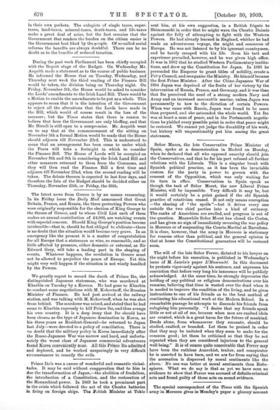. Prince Ito'a was a career of wonderful and romantic
vicissi- tudes. It may be said without exaggeration that to him is due the transformation of Japan,—the abolition of feudalism, the introduction of a Constitution, and the restoration of the Monarchical power. In 1863 he took a prominent part in the crisis which followed the act of the Choshu batteries in firing on foreign ships. The Pritish Minister at Tokio sent him, at his own suggestion, in a British frigate to Shimonoseki in order that he might warn the Choshu Daimio against the folly of attempting to fight with the Western Powers. He bad already learned in England, whither he had made an adventurous voyage, the blight and resources of Europe. He was not listened to by his ignorant countrymen. and he barely escaped with his life. Soon his tact and experience prevailed, however, and he was given high office. It was in 1882 that he studied Western Parliamentary institu- tions, and drew up the Constitution for Japan. In 1885 he persuaded the Emperor to grant titles of nobility, create a Pri‘-y Council, and reorganise the Ministry. He himself became the first Prime Minister. After the Chino-Japanese War of 1894 Japan was deprived of the fruits of her victory by the intervention of Russia, France, and Germany, and it was then that Ito perceived the need of a strong modern Navy and Army and an increased mercantile marine, unless Japan was permanently to bow to the dictation of certain Powers. When war came with Russia, Japan was found to be more than prepared, and she astounded the whole world. Yet Ito was at heart a man of peace, and in the Portsmouth negotia- tions be yielded every possible point in order that peace might be restored. We cannot yet judge the durability of his work, but history will unquestionably put him among the great statesmen.










































 Previous page
Previous page